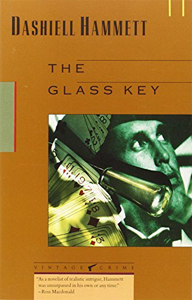I generally don’t like getting into the nitty-gritty of political gamesmanship, but such is the writing skill of Dashiell Hammett and the appeal of his antihero Ned Beaumont that “The Glass Key” (1931) is nearly as much of a masterpiece as the more famous “The Maltese Falcon” (1930) and “The Thin Man” (1934).
Ned Beaumont, usually referred to by his full name by the omniscient narrator, doesn’t even like his own self, but he knows he’s good at what he does. If this professional gambler and political hanger-on (and temporarily deputized detective for the mayor) has a moral code, it’s a more flexible one than those of the Continental Op (“Red Harvest” and “The Dain Curse”), Sam Spade or Nick Charles.
He sure knows how to play games, though. In the first narrative step down a whodunit that Hammett rather stunningly keeps fairly clued and coherent (at least for a dialed-in reader; this is not a novel to be read lightly), a bookie, Bernie Despain, owes Beaumont money.

“The Glass Key” (1931)
Author: Dashiell Hammett
Genre: Hardboiled mystery
Setting: 1931, unnamed Northeast city
Beaumont wants the money, so he frames Despain for the novel’s core murder, that of Taylor Henry, the senator’s son. If Despain pays Beaumont back, he’ll remove the planted evidence and not call the police. Despain pays what he owes. Issue resolved.
You might say Beaumont uses unethical means (a frame-job) to achieve an ethical end (his being paid what he’s owed). In reading Hammett novels, a reader must be willing to question conventional notions such as “two wrongs don’t make a right.” Heck, in “The Glass Key,” merely one wrong sets things right.
Don’t hate the player …
“The Glass Key” is the author’s calmly delivered treatise to a Pollyanna-minded reader that (setting aside the wider scope for now) this unnamed 1930s Northeastern city is run by – not official criminals, but – criminally minded politicians. And therefore it’s not only fair game, but actually sensible, to play by this city’s bastardized rules.
Paul Madvig — Beaumont’s best friend and the leading political mover in the city, the backer of the mayor currently in office – doesn’t even profess political goals for the good of the citizenry, at least not around those he trusts. His big goal is to see a bridge project go through in the coming years, because he will be able to line his own pockets.
The political class leads relatively normal lives, casually inviting each other over to dinner. Beaumont even calls Paul’s mother “Mom,” a confusing-at-first affectation that shows Paul is like a brother to him. Hammett uses the classic noir trope of a femme fatale gumming up the works in a rather innocent way here, as Paul is smitten with senator’s daughter Janet but doesn’t know what moves to make, socially.

It’s a given that everyone is corrupt in “The Glass Key,” but rather than creating a cynical style piece like the much-later “Sin City” comics, Hammett shows the reader the specifics. For instance, the local newspaper’s publisher – while stopping short of engaging in outright yellow journalism – allows his coverage to be steered because of the interests of corporations intertwined with the paper.
… Hate the game
Five decades later, corporate conflicts of interest created by mergers would forever compromise investigative journalism, but Hammett predicts the future here. Keeping the scale small (and not even naming the city, which isn’t New York but also isn’t a tiny, insignificant town) is perhaps the only safe thing about “The Glass Key.”
Heck, Beaumont even fistfights his best friend at one point. Gunplay is part of daily life (when Beaumont rents a car, the attendant helpfully tells him where the spare gun is stored!). And our antihero’s chat with Paul’s rival crime boss, Shad O’Rory, casually turns from amicable to a case of Beaumont being repeatedly thrown across a room by the boss’ thug.
A corpse turning up in a private room of a bar isn’t cause for shock on the part of the bar owner. It’s merely a cause for concern about being caught up in an investigation.
It might be a case of relative morality: This city is so caked with corruption that we see Beaumont as simply operating in reality, rather than contributing to it. There’s nothing one person – even a strong personality like him – can do to make it better or worse. (But he can at least discover the true murderer, the one morally straightforward thing he does – and it’s a satisfying revelation.)
That having been said, he’s not above accepting the flirtations of the publisher’s wife – while the publisher is in the same house! Or of stealing his best friend’s girl, even though he doesn’t particularly admire her. By the time that happened, I simply found it appropriately delicious – Ned Beaumont being Ned Beaumont. “The Glass Key” is a case of high art coming from the morally lowest of places.
Sleuthing Sunday reviews the works of Agatha Christie, along with other new and old classics of the mystery genre.

